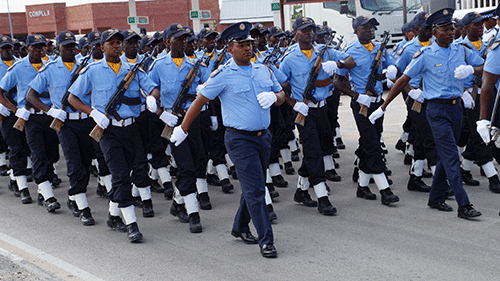The Namibian Police Force has come under fire for allegedly neglecting junior officers while rewarding those atthe top echelons through the creation of a new rank on its structure.
The new position will be called ‘assistant chief inspector’, this paper has established. It was allegedly necessitated by the pay disparity that exists between the position of inspector and chief inspector.
Its conception is at an advanced stage as submissions to that effect are currently with the Public Service Commission (PSC), New Era has learned. At present, a police inspector takes home between N$277 000
and N$330 000 annually, while the chief inspector collects between N$412 000 and N$500 000 a year.
This means the force wants to introduce a new rank under the pretext of closing the N$14 000 monthly salary hole that exists between the two senior ranks.
This has caused a ruckus within the force, where those at the bottom barely make enough to make ends meet.
Those who are against the new rank say “it will demoralise the junior members and will kill our operations. It will also cost the public a lot of money”.
To cater for the new position, additional costs to the already-drained State purse will be incurred to buy new uniforms, police badges and designs as well as salaries.
“They always tell us that they care for the junior-ranked members of the force. Why don’t they take a bottom-up approach to close the salary gap? When we demand an increment, we are told ‘there is no money’. So, where is the money going to come from for this position?” asked another police officer.
Bottom
At the bottom of the police’s food chain are the constables, the lowest-ranked officers, who predominantly make up the police’s operations on crime prevention, or render other day-to-day services to the public at charge offices.
According to the current salary structure, the highest- paid constable earns N$123 000 per year. This amount is subject to taxation. When juxtaposed to a chief inspector’s earnings, the difference is a glaring N$377 000.
Over the years, the police’s top brass have been accused of practising nepotism and discrimination through promotions.
“Who will qualify, and why? It is just another way to promote their families and friends,” complained another member.
Insiders further confided that the police have over the years rejected the proposition, instead suggesting that the general salary structure be reviewed “in order to benefit the least-paid officers”.
It would appear, however, that government has other ideas.
Police minister Albert Kawana is said to be the driving force behind the creation of the assistant chief inspector’s post. Talk in the police is that Kawana – who retires from active politics in 2025 – wants to cement his legacy through this position.
Approached for comment this week, the legal guru said he could only provide details after getting feedback from the PSC.
“I cannot give you information for now. We are still waiting for information from the Public Service Commission,” Kawana said, adding that next week Wednesday would be the ideal day for his response.
Tight-lipped
Meanwhile, deputy inspector general for administration, major general Anne-Marie Nainda declined to comment on the motivation for the post, instead directing all questions to new police chief, inspector general (IG) Joseph Shikongo.
“I cannot comment. It is not in the public domain. Why are these junior members leaking [confidential] information?” she asked rhetorically.
On his part, Shikongo asked those aggrieved by the new role to approach his office, rather than complaining to the media.
“They must call the inspector general. You are from New Era. They don’t report to New Era. People who are not happy know the internal procedures to
follow,” he emphasised.
Moreover, the IG promised
to inform the nation once the process is finalised.
No money
The information comes less than three months since government agreed to a N$1.3 billion salary increment package for civil servants. Broken down,
it translates to a 3% basic salary across the board, housing allowances for civil servants below management up by 11 %, and transport allowances increasing by 14%.
Despite not having money, government agreed to effect the increment to avert a catastrophe.
It chose ‘peace over money’, was the rumbling message by Cabinet secretary George Simataa on the day. “Once you lose peace, you are not going to get it back. It is about peace. This country was going to go into turmoil if we did not do what we have done,” Simataa told reporters after striking a deal with union representatives.
Asked where government would get the money to cater for the increment, he said the deal was worth the risk while they figured out the means to generate revenue.



